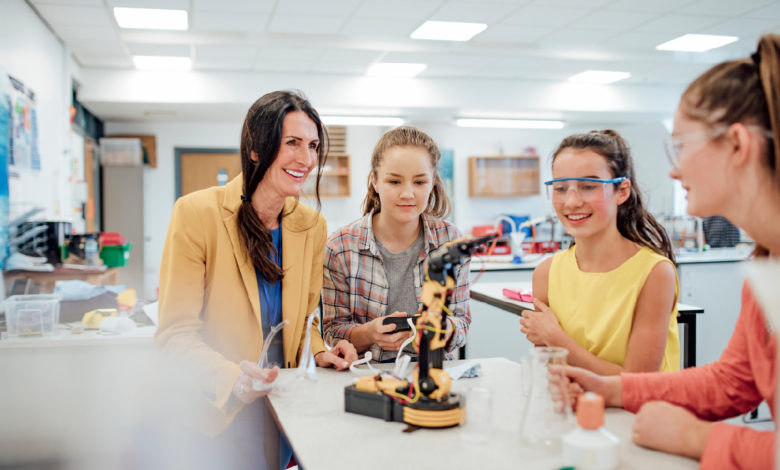
The following is excerpted from the National Science Board’s recent report on “The Skilled Workforce,” which highlights the increasing importance of STEM-related skills for the broader U.S. workforce:
To grow our nation’s science, technology, engineering and mathematics (STEM) capacity and ensure that American’s nation-wise can participate in a science and engineering (S&E) intensive economy, the United States must foster its Skilled Technology Workforce (STW) – individuals who use S&E skills in their jobs but do not have a bachelor’s degree. Rapid changes in the nature of work, education, technology, workforce demographics, and international competition have led the National Science Board (NSB) to conclude that our competitiveness, security, and research enterprise requires this critical, but often overlooked, segment of our STEM-capable workforce. Adding to the near-term urgency, a National Academies of Science, Engineering and Medicine report predicts a shortfall of nearly 3.4 million skilled technical workers by 2022.
Expanding the diversity and inclusivity of science and engineering is vital to the future of the S&E enterprise and crucial to maintaining the broad public support for S&E that has fueled American prosperity and national security for the past 70 years. It is in the nation’s interest that all Americans, including the two in three U.S. adults who do not have a bachelor’s degree, have the opportunity to participate in and benefit from our scientific and technological progress. To achieve this, the Board believes that the United States should increase the emphasis on cultivating the STW as part of continued robust support for the education of scientists and engineers.
Over the past two years, the NSB Task Force on the Skilled Technical Workforce has identified opportunities and challenges facing students, incumbent workers, businesses, educators, and others involved with the STW.2 In the course of our activities, four systemic issues surfaced that will necessitate new partnerships among various types of educational institutions, all levels of government, and industry to strengthen this critical segment of the workforce. By focusing on these areas, we seek to build on the efforts of the White House, Congress, and others to create STW opportunities for more Americans. We offer the following recommendations:
CHANGE THE MESSAGE: The NSB and the National Science Foundation (NSF), and other S&E leaders should communicate the importance of the STW to our nation’s S&E enterprise, individual economic prosperity, national security, and U.S. global competitiveness. Raising awareness about STW career and educational pathways can also help to address misperceptions and lack of awareness of skilled technical career opportunities among parents, educators, guidance counselors, and students. Key messages include:
-
-
- Skilled technical work is crucial to the nation and its S&E enterprise.
- The multiple educational pathways into the S&E enterprise are complementary and interdependent. Together they produce the educated, skilled, and diverse workforce the United States needs in today’s knowledge-and technology-intensive world.
- Skilled technical work is a pathway that can lead in a variety of educational and career directions.
- Pursuit of skilled technical work is about personal preferences and choices.
-
FOCUS ON THE DATA: To understand and begin to address data gaps, NSF’s National Center for Science and Engineering Statistics (NCSES), with additional federal resources and collaborating with other statistical agencies, should collect nationally representative data on the education, skills, and workforce characteristics of the STW. NSF should promote partnerships between governmental and non-governmental (industry, academia) stakeholders in the STW to share data and develop tools for public use and workforce planning.
LEVERAGE THE PORTFOLIO OF FEDERAL INVESTMENTS: There is an opportunity for the Federal agencies that support STW-related programs to leverage one another’s activities and maximize the nation’s federal investments in the STW through a holistic, coordinated approach. NSF can lead by example by conducting a full portfolio analysis that will value and categorize its STW investments across all directorates in the areas of education, research, infrastructure, data collection, and analysis. The analysis of NSF’s portfolio of STW-related investments could publicize and inform stakeholders about the breadth of NSF’s contributions to the STW, build awareness of funding opportunities, and help maximize and leverage the impact of these investments.
BUILD PARTNERSHIPS: In strengthening educational pathways for the STW, policymakers and educational institutions should recognize that K-12 school systems, two-year colleges, four-year colleges and universities, and other post-secondary education and workforce development programs are integral, synergistic parts of a whole. These institutions should work as partners together with business and industry to grow the STEM capable U.S. workforce via STW programs that are tailored to the needs of their local communities. Policymakers can encourage the creation of such partnerships by developing federal programs that require partnership participation from stakeholders from multiple sectors.
Founded by the National Science Foundation Act of 1950, the National Science Board is a policy and program oversight body for NSF and also serves as an independent body of advisors to both the President and the Congress on policy matters related to science and engineering and education in science and engineering. The complete NSB Skilled Technical Workforce report is available online for review at: https://www.nsf.gov/nsb/publications/2019/nsb201923.pdf
Two related and noteworthy reports of potential interest include:
The National Academies 2017 report entitled “Building America’s Skilled Technical Workforce” is available online at: https://www.nap.edu/catalog/23472/building-americas-skilled-technical-workforce
A recent report released by the Science For US Coalition, finds that 67% of U.S. jobs and 69% of the nation’s gross domestic product (GDP) are supported by science, technology, engineering and mathematics (STEM). The analysis was conducted by FTI Consulting on behalf of 10 leading U.S. scientific, engineering and industry organizations including IEEE-USA. More information including a link to the report is available at: https://ieeeusa.org/stem-supports-two-thirds-of-u-s-jobs/






